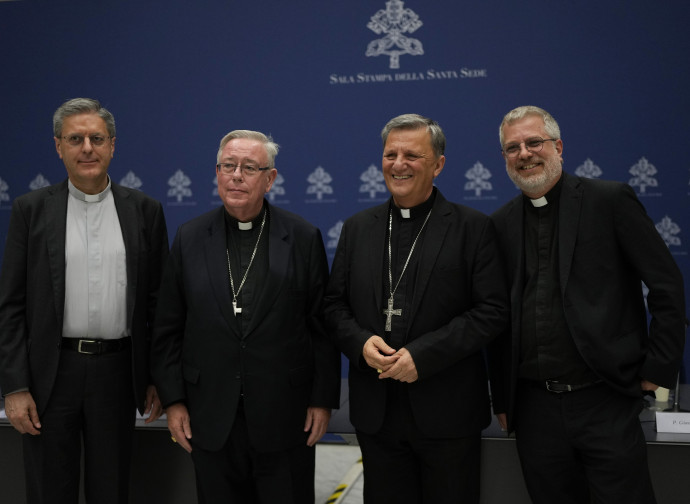The Instrumentum Laboris confirms synodality dangers
The Synod working document is full of 'listening', 'circularity', 'relational conversion' and 'conversation in the Spirit'. For 'walking together' the how is sufficient, without knowing where to go.
- Instrumentum Laboris, torture by words prepares October Synod by Nico Spuntoni

Yesterday 9 July saw the publication of the Instrumentum laboris of the Second Session of the XVI Ordinary Assembly of the Synod of Six Bishops entitled How to be a Synodal Church in Mission? which will take place next October. The first session was held in October 2023. The Daily Compass has expressed on several occasions, especially at the conference in Rome October 2023, where Cardinal Raymond Burke spoke, on the eve of the first Session of the Synod, its assessment of the entire synodal process, its overt or covert aims, its weaknesses and also its grave dangers. These concerns, which are widely present in the Church even if the official communication does not mention them, are now also confirmed by this working tool that will be placed in the hands of the Synod participants.
The synodal process as a whole has three major limitations: the first is given by the theological uncertainty about the very concept of synodality, which is only defined as a process; the second, consequent to the first, is that it is entrusted to synodal praxis to bring out what synodality is in its concrete development; the third is that the working tools, such as this one published yesterday, are basically operational and methodological indications, not content. Interest in method runs through the entire document, according to which synodality is ' a way of walking together'. Synodality itself is therefore a method, so that the document announces: "we can certainly claim to have learned a method"; "we are still learning how to be a missionary synodal Church", "criteria and methods therefore need to be defined", a "true conversion in practices" is needed. Moreover, even the title of the next Session is opened with the conjunction as.
Let us recall that on 16 February 2024, Francis removed the Synod's competence over ten macro-topics from the Synod’s work, which were assigned to ten study groups outside the Synod. These will have to complete their work by June 2025, although they will be able to provide an interim report to the October Assembly. The ten topics in question are the hottest potatoes, so one might think that, in fact, the Synod has been depowered. However, it could also be that it has been entrusted with a task that is perhaps less disruptive but more penetrating, aimed at provoking in the Church a practical conversion to synodality as a method. In this sense, the methodological rather than content-oriented character of theI nstrumentum laboris would find further justification.
It is also evident, however, that the concentration on methodological paths and practices to be favoured contains the danger of opening up to conclusions that are very problematic doctrinally, but confirmed and corroborated by the new practical paths implemented. This danger is aggravated by the theological imprecision of many expressions used. It is not easy to understand clearly what the 'circularity' of synodality consists of. Even more difficult seems to be a clear understanding of what is meant by 'relational conversion'. And undoubtedly even more difficult to understand the meaning of 'conversation in the Spirit'. These are expressions of sociological or pastoralist derivation that can be oriented towards the most diverse outcomes. And since we are experiencing that these expressions refer to the method and that it is the method that will say what synodality is, it is well founded to be concerned about on which shores one wants to land with these slogan-phrases. When the document speaks of the correct attitudes for living synodality, it expresses itself with ambiguous words: 'inner freedom', 'openness to new things', 'listening'. I would also point out that while expressing oneself in these nuanced and uncertain ways, theologically well-defined words and concepts are never used, such as, for example, deposit of faith, tradition, magisterium, grace, conversion understood as escape from sin and not as "relational conversion" or "conversion of practices".
The insistence on method takes on astounding aspects in a paragraph devoted to Transparency, accountability, evaluation. Here terms such as accountability are even borrowed from business economics, claiming that the book of Acts would have already spoken of them, and such a dense list is made of acts of transparency and accountability that any Christian community should adopt that it blatantly disavows the need, also expressed by the document, for a "non-bureaucratic Church".
Let us now come to the two most worrying points of this working tool. Since the synodal Church must first and foremost 'listen', it is considered appropriate to establish a 'ministry of listening' as an 'open door of the community, through which people can enter without feeling threatened or judged'. It can already be predicted that anything will come through that door and that LGBT groups will be very happy. The second is the issue of decision-making. Of course the text says that the final word rests with the bishop, but it also says that 'a purely consultative vote diminishes the value of the consultation' and that 'an orientation that emerges in the consultative process as the outcome of proper discernment (...) cannot be ignored'. And who will judge whether the outcome of the discernment process is correct? The bishop? No, the process itself of which the bishop will also be a part. There will be things to watch out for in this area too.
